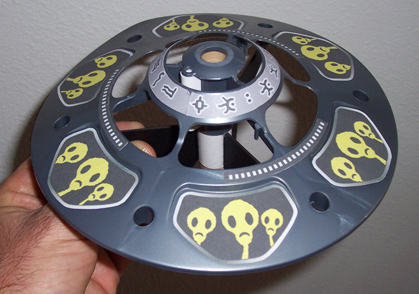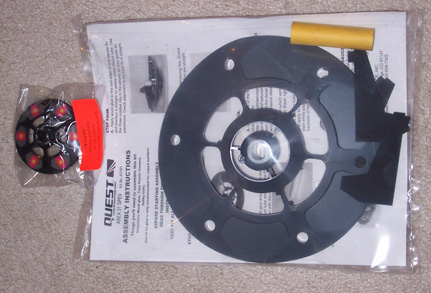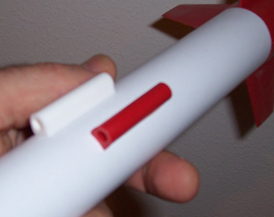| Construction Rating: | starstarstarstarstar_border |
| Flight Rating: | starstarstarstarstar_border |
| Overall Rating: | starstarstarstarstar_border |
Construction: I cleaned off the saucer of any molding release agents with light soapy water and a paper towel. I wanted to be sure that later on that the self adhesive “decals” would stick well. The fins were laser cut from thick black fiberboard stock. I had to wipe off the burnt edges with a paper towel. There was black ash marks from the fins on the yellow motor mount tube. There are no wire landing leg “antennas”. The instructions were printed in black and white on one side of an 8 1/2" x 11' sheet. Photo illustrations accompanied the directions. Finishing: Be sure to spray and seal the printed “decals” with a shot of clear coat to prevent smearing. All four of the decals have a suggested color for the saucer. I was reluctant to spray the saucer, I was concerned the paint wouldn’t adhere well on the slick surface of the saucer top. My saucer was molded in a medium metallic grey color. You are directed to use a hobby knife to cut out the “decal” images. I cut mine with scissors. Cutting out the decals is the most time consuming part of the build. It took 20 minutes to cut all 12 pieces. Placement was not a problem except for the highest center ring decal stickers. It’s a full ring, made-up of three arc shaped pieces. I had to place the pieces higher than the centerline of the highest plastic “cone” to get all the edges to match up. The finished saucer looks great! It was a fun and easy build. It was interesting to see the original design improved using fewer parts and updated graphics. The black fins, white engine tube, white lug and (original color plastic) grey saucer all compliment each other well. Construction Rating: 4 out of 5 Flight: I was flying alone today, I wanted to get this review in quickly, our next R.O.C.K. NAR section launch wasn’t for another two weeks. I packed up my (20 year old) Estes yellow Porta-Pad launcher. This launcher had the pre-lightning bolt legs. After some continuity problems, I scraped off some battery corrosion and got a light. Prep was simple, friction fit the engine with a little masking tape and install the igniter. There was no engine hook and of course, no wadding. Countdown and launch! The engine really had to work to get it airborne. It started arcing over half way up. This wasn’t a vertical flight, I had a slight wind to content with. Being a C6-0 engine, the propellant “wall” broke through just before it turned over. It landed on it’s top, 50 feet from the launcher. I picked it up quickly, the lawn was a little wet and I didn’t want to ruin the paper stick-on decals. (Another reason to clear coat after printing.) While I am terrible at guessing altitudes, it may have got to 125 feet. I followed up with the (Freebie) Micro Maxx saucer. The retaining ring on the plastic engine mount was a little tricky, There are tiny arrows to show you which way to lock the ring. I didn’t want to lose the ring, I added two small tape strips on the ring and engine mount tube. As the reviews before had said, not much altitudem I would guess 40 feet. Still, a lot of fun. I’m an Odd-Roc fan, I know both saucers will be favorites. Recovery: Flight Rating: 4 out of 5 Summary: Overall Rating: 4 out of 5 Brief:
Brief:
This is a re-issue of an out of production Quest(ARF) Saucer Odd-Roc. I ordered two sets of these from Quest during their recent 40% off Christmas sale. One saucer kit and three C6-0 engines were part of the combo deal for $9.00. Quite a good price, a fun rocket for a little more than the price of the three engines. As the Quest website explains a supply of saucer tops was found in a mis-marked crate at the Quest facility. Quest's president Bill Stine redesigned it using some existing parts to fashion this S.P.E.V. kit. SPEV stands for “Spare Parts Elimination Vehicle”. The name S.P.E.V. actually goes back to an old Estes kit. It was sold with the subtitle - SPace Exploration Vehicle. Quest also included a “Freebie” MicroMaxx Mini saucer in each kit bag. It is a scaled down copy of the big saucer. A nice surprise, even though I’ve heard it doesn’t fly very high, I’d always wanted one.
The parts are few:
 I was a little surprised to see the plastic saucer top was warped. It shouldn’t affect flight characteristics. The inside of the saucer top reads (Copyright) 1998 TOY BIZ, INC. and MADE IN MEXICO. This “kit” only includes the top of the saucer. The smooth bottom half with integrated fins and antenna mounts in not included (or necessary) for this saucer version.
I was a little surprised to see the plastic saucer top was warped. It shouldn’t affect flight characteristics. The inside of the saucer top reads (Copyright) 1998 TOY BIZ, INC. and MADE IN MEXICO. This “kit” only includes the top of the saucer. The smooth bottom half with integrated fins and antenna mounts in not included (or necessary) for this saucer version.
 The launch lug was molded white plastic, thick and contoured to fit against the BT-20 sized motor mount tube. I knew I had seen a lug like this before. I put it next to my old MPC Nike Patriot, it’s the same style molded lug that Harry Stine designed for MPC thirty years ago.
The launch lug was molded white plastic, thick and contoured to fit against the BT-20 sized motor mount tube. I knew I had seen a lug like this before. I put it next to my old MPC Nike Patriot, it’s the same style molded lug that Harry Stine designed for MPC thirty years ago.
No engine hook. Also missing are the wire landing legs. Not a problem. The saucer top is molded from a strong, flexible plastic. Landings shouldn’t be a concern. When all assembled the saucer is very sturdy.
Go to the Quest website and download the decal. You can choose from four different decals. I chose Decal Sheet 3, the one with the “Bewildered” Aliens. The yellow Alien skin color reminded me of the old “Glow-In-The-Dark” toys of the 1960's. Being this model is an Odd-Ball, I went for the most outrageous pattern.
Quest recommends a B6-0 or C6-0 engines. Previous EMRR reviews say the B6-0 is too underpowered for this saucer. The original instructions (from 1998) say to use a C6-0 engine only. I will fly it with the C6-0s that came with the sale combo package.
I was curious to see if there was any burn marks at the plastic area above the top of the engine. There was none!
Bill Stine did a great job using the existing materials to put a fresh, improved spin on an existing platform. The model lost a point for the lug that didn't fit the 3/4" diameter engine tubing contour. And the supplied engine tube was flimsy. Neither original supplied parts would effect flight though. The fiber fins were well cut and strong.
Other Reviews
- Quest Area 51 Saucer By Bill Eichelberger (August 12, 2013)
My Quest Area 51 Saucer came as a throw in with a rocketry lot I bought off of Ebay, much of which proved to be cleverly disguised junk. But, I paid more in shipping than I did on the auction. I initially threw the saucer aside as it was covered with dust and spider webs and missing two of the three landing legs. After my initial disappointment, I gave the saucer a second look. ...
- Quest Area 51 SPEV Saucer By Dick Stafford (March 21, 2009)
Brief: Although this resembles Quest's original Area-51 saucer , it varies slightly from the original. This is a SPEV (spare parts elimination vehicle) kit based on a crate of saucer tops that Quest found lying around. The bottom section is redesigned since the original parts were missing. Thus, although really simple to build, it is not RTF. It also doesn't have the wire 'legs' and ...
- Quest Area 51 SPEV Saucer By Manuel Mejia, Jr. (December 15, 2008)
Brief: Back in the fall of 2008, Quest Aerospace found a stack of 10 year old saucer tops for their 1998 vintage fly saucer RTF rocket. The top plates were the only pieces left from the kit. Rather than discarding them, Bill Stine added an 18 mm motor mount tube, a motor block, a plastic straw, and 3 specially cut black fiberboard supports/fins. One section of the fiberboard ...
- Quest Area 51 Saucer By Nick Esselman
I purchased the Area 51 Saucer to add to my 18mm U.F.O. comparison article . It is labeled as a Ready-to-Fly model from Quest made from plastic. CONSTRUCTION: The instructions are printed on the front and back of a single 8½ x11 page of paper. They include illustrations for attaching the legs and for flying. Attaching the legs is done by sliding a plastic holder into a slot on ...
- Quest Area 51 Saucer (RTF) By Chris Taylor Jr.
This is another complete ready to go rocket with pad etc. . . again pad [stunk] but I got another one of those launchers. About the pad; take an Estes' Pad and make it look like the picture. Okay, now remove the screw in launch rod mount . . . it just sits in there. No secured angle adjustment either. It is by a measly leg swivel that props up one leg like sticking a rock under a leg. Now, ...
 |
 |
Flights
 |
 |
